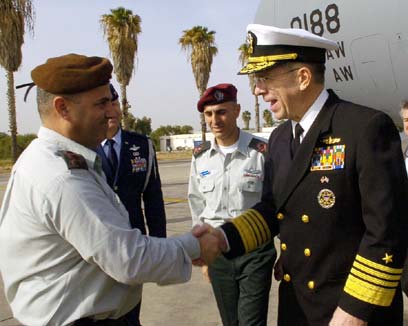
Mullen: Attack on Iran could have 'unintended consequences'
During press briefing in Tel Aviv, US army chief hints strike on Iran possible if nuclear talks fail, but adds, 'We are not there yet'
Admiral Mike Mullen, chairman of the US Joint Chiefs of Staff, told reporters in Israel on Sunday that the US administration is very serious regarding its plans to impose harsh sanctions on Iran and expressed hope that such a step would 'not end in violence."
During a press briefing held at the US embassy in Tel Aviv, Mullen hinted that the US could attack Iran if negotiations failed and that such action could have "unintended consequences" throughout the volatile Middle East.
“Of course, there are limits and this (military strike) option is on the table, but we are not there yet,” Mullen said, adding that it was important to let diplomacy and international pressure work before looking into military options.
The US army chief, who accused Iran of destabilizing the entire Middle East, said the according to estimates, it will obtain a nuclear weapon within one to three years.
Asked whether the US would prevent Israel from striking Iran, Mullen said IDF Chief of Staff Lt.-Gen. Gabi Ashkenazi made it clear to him that Jerusalem backs the US administration's policy vis-à-vis Iran, adding that Washington was committed to Israel's security.
Later Sunday, Mullen and IDF chief Ashkenazi met privately to discuss a host of security issues, including the Iranian threat, Syria and the transfer of arms to Hezbollah in Lebanon.
Following the meeting, during a dinner held at a Tel Aviv hotel in Mullen's honor, Ashkenazi called for increased cooperation between the US and Israeli armies, and wished the American troops success in Afghanistan.
US Secretary of State Hillary Rodham Clinton, on a quick visit to Persian Gulf allies Qatar and Saudi Arabia, said in a speech that Iran has not lived up to its nuclear obligations and has rebuffed US and international efforts to engage in serious talks.
As a result, Clinton told the US-Islamic World Forum that the US and others were working on "new measures" to try to persuade Iran to change its course.
"We do not believe Iran should be a nuclear weapons power," Clinton said at a news conference before her address. She criticized Iran's defiance and said Tehran would not succeed in overcoming international opposition to it nuclear ambitions.

Mullen (R) after landing in Israel Sunday (Photo: AP)
In an exchange with the audience after the speech, Clinton said, "It's time for Iran to be held to account for its activities."
The United States and some of its allies suspect Tehran is using its civilian nuclear program as a cover to build nuclear weapons. Tehran denies the charge and says it only has peaceful intentions.
US President Barack Obama has said that work to broaden economic sanctions in the UN Security Council is moving along quickly, but he hasn't given a specific timeline. China, one of five permanent members of the Security Council, has close economic ties to Iran and can block a resolution by itself.
Earlier Sunday, Israeli Prime Minister Benjamin Netanyahu said he will push for urgent "crippling sanctions" against Iran during talks in Moscow on Monday with Russian President Dmitry Medvedev.
"We will discuss a number of issues -- first and foremost, the Iranian issue," Netanyahu said on Sunday at the weekly Israeli cabinet meeting, before flying to Moscow.
Mullen also addressed the major NATO-led offensive against a Taliban stronghold in Afghanistan, saying it began well but its completion is difficult to predict.
"It's off to a good start," he told reporters when asked about progress in the advance on the town of Marjah, now in its second day.
"It's actually very difficult to predict (the end)," Mullen said. "We have from a planning standpoint talked about a few weeks, but I don't know that."
The 15,000-troop offensive, one of NATO's biggest against the Taliban since the Afghan war began in 2001, is designed to extend Kabul's influence over the last big rebel bastion in Helmand province.
"This is focused on the people," Mullen said.
"This is not focused on the Taliban, and it is a strategy not just to clear the area but to hold it and then build right behind it so that there is a civilian component here and there is a local governance...that is going to be installed as well."
Reuters, AP and Hanan Greenberg contributed to the report










